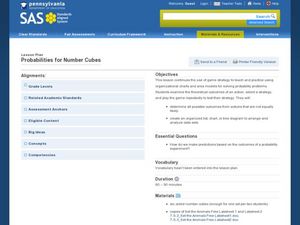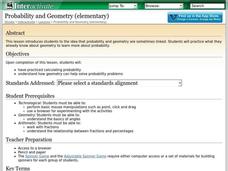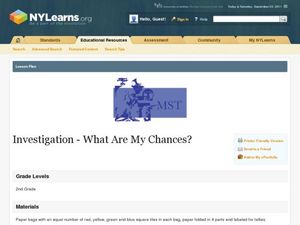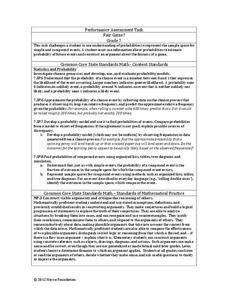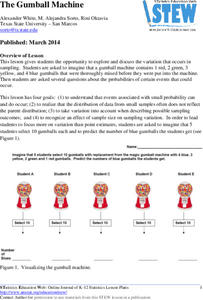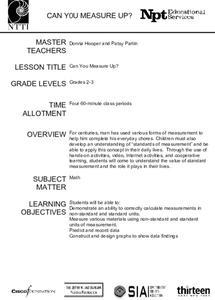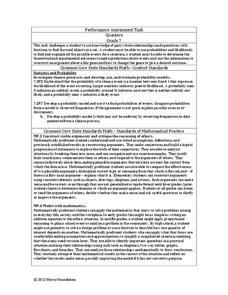Curated OER
Deductiva Deductions (Deductive Reasoning)
Third graders apply deductive reasoning and make predictions. In this language arts lesson plan, 3rd graders discuss questions and use deductive reasoning to make a prediction. Students look for patterns and prior knowledge to make...
Curated OER
Koala Lou
First graders predict what will happen in different parts of the story Koala Louby Mem Fox. In this predictions lesson plan, 1st graders say and write their predictions.
Curated OER
Magnets and Interactions
Second graders discover what magnets can do. In this magnet activity students make predictions about magnets. They experiment with the magnets and record their data on a chart.
Curated OER
Total English Upper Intermediate: Future Plans
In this making predictions learning exercise, students complete 8 sentences by using the correct form of the verbs in parentheses. Students also use the 6 prompts to discuss future plans with partners.
Curated OER
Probabilities for Number Cubes
Young scholars explore the concept of probability. For this probability lesson, students roll a six-sided number cube and record the frequency of each outcome. Young scholars graph their data using a frequency chart and keep...
Curated OER
Probability and Geometry
Learners examine the relationship between probability and geometry to solve problems. In this geometry and probability lesson, students investigate the effect of changing percentages on a spinner to the probability of landing on a...
Curated OER
Calculating Theoretical & Experimental Probability
Students collect data by conducting a survey of fellow classmates. They investigate the relationship between estimates obtained from samples and theoretical probabilities. Answer keys included.
Curated OER
Data Management and Probability: Applications
In this data management and probability applications activity, 7th graders solve 13 different types of problems that include finding the mean, median, mode, and range of each set of values, as well as, solving a number of word problems....
Curated OER
Do You Feel Lucky?
Students calculate simple probabilities using mathematics then roll dice to test their predictions.
Shodor Education Foundation
Playing with Probability
Review basic probability concepts with your class using different-colored marbles in a bag. Then pair up learners and have them play a cool online interactive game in which they race miniature cars using the roll of a die or...
Curated OER
Advanced Algebra: Do You Feel Lucky?
Students explore the realm of mathematical probability while playing a game of chance. after constructing paper rockets, they fire it enough times to determine the probabilities of the rocket traveling past a marked distance and of it...
Curated OER
The Probability Scale
Students collect data and make predictions. In this probability lesson, students perform experiments calculating the chance of an event occurring. They draw conclusion based on their data.
Curated OER
Investigation--What Are My Chances?
Seventh graders investigate theoretical and experimental probability by conducting a series of experiments with multiple trials, comparing results, combining results and making conclusions. They express probabilities as fractions,...
Noyce Foundation
Fair Game?
The game should be fair at all costs. The mini-assessment revolves around the ability to use probabilities to determine whether a game is fair. Individuals determine compound events to calculate simple probabilities and make...
Curated OER
Do You Feel Lucky?
Students explore probability by using games based on probable outcomes of events. They name all of the possible outcomes of an event and express the likelihood of such an event occurring.
Shodor Education Foundation
Racing Game with One Die
Pupils roll a die to figure out which car advances on a race track. They determine the rules for each car moving forward and, given the statistics of the winner, compare if it matches their predictions.
American Statistical Association
The Gumball Machine
Chew on an activity for probability. Given information on the number of gumballs in a gumball machine, scholars consider how likely it is to randomly draw a blue gumball and how many of each color they would draw in 10 trials if the...
Radford University
Corn and Popcorn
Have a popping good time. Using probability and statistics skills, learners determine which type of popcorn to buy based on the percentage of kernels popped. After analyzing corn and popcorn sales to make a prediction of future sales,...
Curated OER
Can You Measure Up?
Here is a well-designed lesson on common standards of measurement for your young mathematicians. In it, learners calculate measurements in standard and non-standard units. They make predictions, record data, and construct and design...
Curated OER
Introduction to Probability
In this probability worksheet, 11th graders review basic probability concepts such as chance, probability lines, and possible outcomes. There are 6 problems on here.
Curated OER
Playing With Probability
Students rotate through work stations where they compute problems of theoretical and experimental probability. In this probability lesson plan, students use simulations of a lottery system.
Noyce Foundation
Counters
For some, probability is a losing proposition. The assessment item requires an understanding of fraction operations, probability, and fair games. Pupils determine the fractional portions of an event. They continue to determine whether...
EngageNY
Events and Venn Diagrams
Time for statistics and learning to overlap! Learners examine Venn Diagrams as a means to organize data. They then use the diagrams to calculate simple and compound probabilities.
Curated OER
Design a Spinner
Spinners are usually used in board games not for math, right? Develop your class's understanding of ratios and probabilities with a spinner activity sheet that will require them to draw spinners according to specifications.






